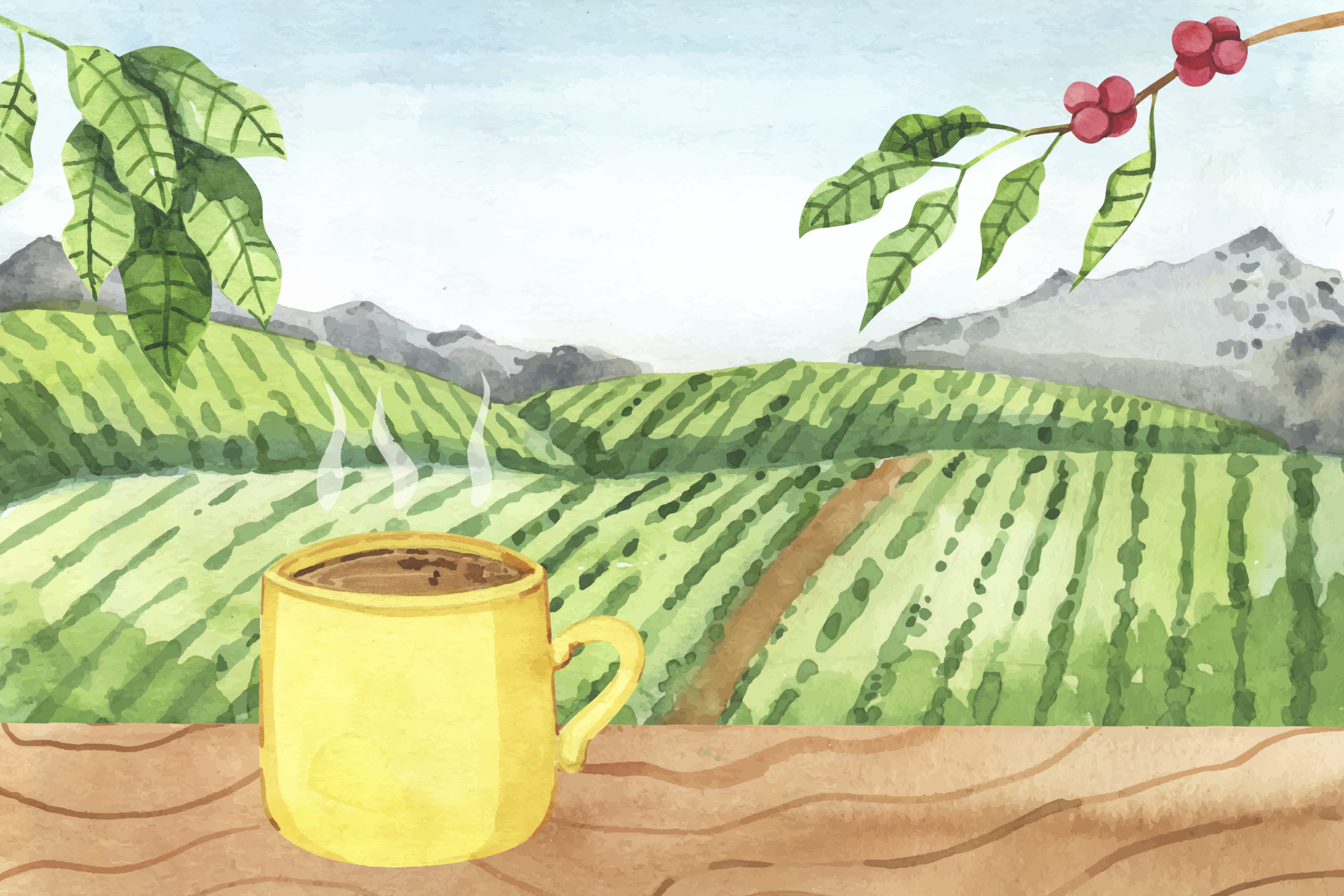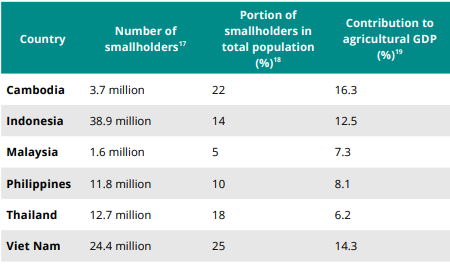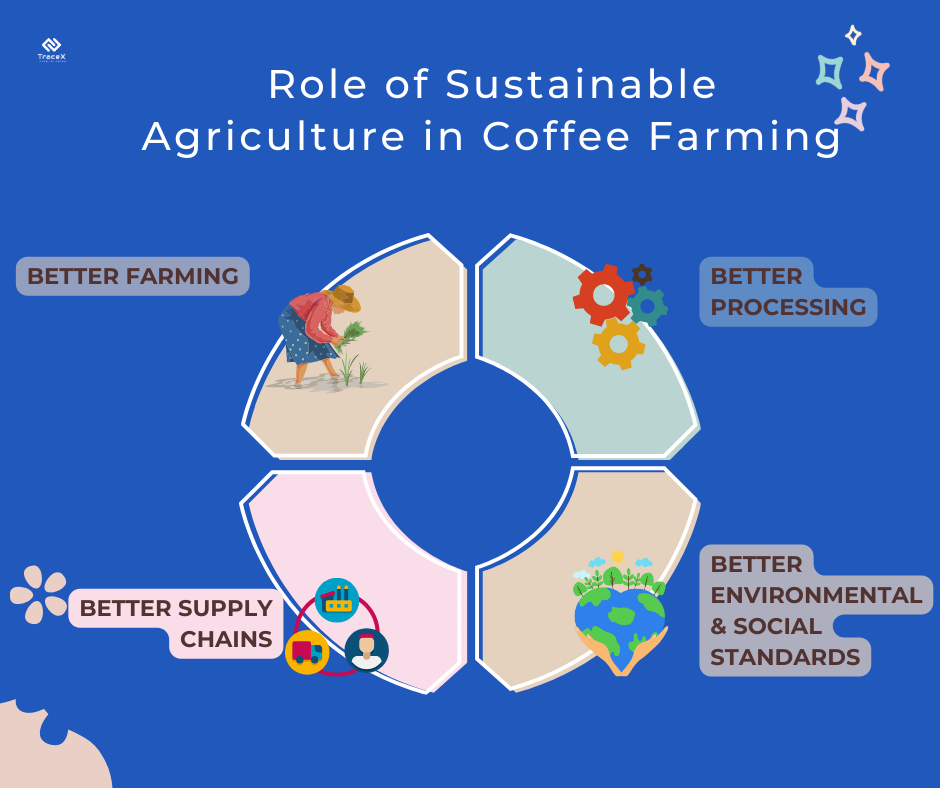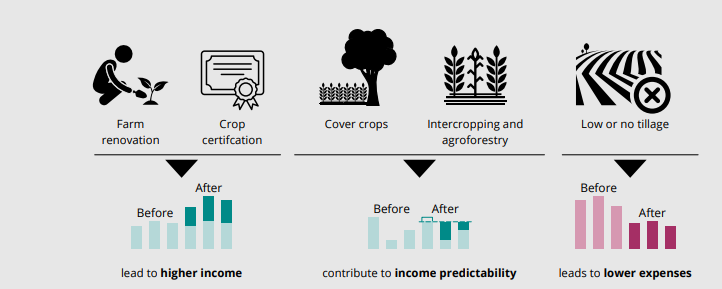Contact: +91 99725 24322 |
Menu
Menu
Quick summary: Explore our blog on supporting smallholder coffee growers in Southeast Asia. Discover impactful initiatives, sustainable practices, and the resilience of local farmers. Join us in fostering a thriving future for small-scale coffee cultivation.

In the lush landscapes of Southeast Asia, smallholder coffee growers play a pivotal role in the region’s coffee cultivation. These dedicated farmers, often tending to modest plots of land, form the heartbeat of the local coffee industry. Coffee production takes place on farms which average approximately one hectare in size, where livelihoods depend on a successful coffee crop.
According to the Asian Development Bank, smallholder coffee farmers across these countries face common challenges that include lack of access to finance and quality inputs; low yields; lack of storage and market infrastructure; lack of opportunity to add value at the local level; and dependence on middlemen.
This blog delves into the world of smallholder coffee growers, exploring their economic significance, cultural contributions, and the imperative of supporting their endeavours. Join us on a journey through the fields where coffee meets culture and discover why supporting smallholder coffee growers is a commitment to sustainable livelihoods, cultural heritage, and the resilience of the global coffee supply chain.
Asia stands out as a prominent producer of globally acclaimed and distinctive coffees. The Flavors of Vietnamese or Indonesian coffee, for instance, are so captivating that dedicated coffee enthusiasts are willing to traverse thousands of miles to experience them.
Southeast Asia has developed into the world’s largest exporter of a number of agricultural commodities. Agriculture is key sector for Indonesian economy. Coffee plays important role for not only national income but also millions of households, including smallholder coffee farmers across Indonesia. About a third of the world’s coffee is produced in Indonesia. Vietnamese coffee holds a special place in the hearts of many, and it serves as a significant export crop for Vietnam, ranking second only to rice. Vietnam is the second largest exporter of coffee globally (behind Brazil), and the largest for the Robusta variety. The Philippines stands out as one of the select countries cultivating all four commercially viable coffee varieties. The local Liberica, known as Barako or Baraco, imparts a robust and powerful flavour profile. These larger cherries and beans are integral to the Philippine coffee landscape, predominantly cultivated in Batangas and Cavite provinces. Thailand is a significant player in the global coffee market. The majority of coffee production in Thailand takes place in the northern part of the country, with the provinces of Chiang Mai, Chiang Rai, and Mae Hong Son being the top coffee-producing regions.
Coffee extends beyond being a globally cherished beverage; it embodies sustenance, education, healthcare, and improved living for around 12.5 million farming families worldwide. Unfortunately, over 80% of these families grapple with poverty. Numerous challenges, such as subdivided family land and diminishing farm sizes, contribute to the struggle. The conundrum deepens as reduced earnings impede necessary farm enhancements, resulting in a cyclical decline in production and sales. Amidst fluctuating global coffee prices, these hardships intensify, underscoring the urgency of addressing the multifaceted issues faced by smallholder coffee farmers.
An estimated 100 million smallholder farmers reside in Southeast Asia.

Smallholder coffee growers in Southeast Asia form the backbone of the region’s coffee industry. These are typically farmers who own relatively small plots of land and are engaged in coffee cultivation. Smallholder farmers significantly contribute to the local and regional economies. Their collective output constitutes a substantial share of the coffee production in Southeast Asia. Supporting them ensures the sustenance of livelihoods and the economic well-being of rural communities. Many smallholder coffee growers in Southeast Asia adhere to traditional farming practices that are integral to the cultural fabric of their communities. Supporting these farmers means preserving and promoting cultural heritage, ensuring the continuation of unique and time-honored cultivation methods. Smallholders often cultivate diverse varieties of coffee, contributing to the richness and diversity of the coffee industry. Supporting them helps maintain a variety of flavors and profiles in the market, catering to the preferences of different consumers. Smallholder farmers are integral to the broader coffee supply chain. Ensuring their sustainability enhances the resilience of the entire coffee industry, making it more robust in the face of challenges such as climate change, market fluctuations, and geopolitical shifts.
Sustainable agriculture plays a pivotal role in ensuring the long-term viability of coffee farming. By adopting practices that prioritize environmental health, biodiversity, and resource efficiency, farmers can create resilient ecosystems that withstand challenges like climate change and pests. This approach contributes to the overall stability and continuity of coffee production.
Embark on a journey into the world of sustainable coffee!
Unveil the key practices and initiatives shaping coffee sustainability.
Dive into our blog
Sustainable coffee farming brings forth a host of environmental and social benefits. Environmentally, it promotes soil conservation, reduces chemical inputs, and preserves biodiversity. By avoiding deforestation and implementing agroforestry practices, sustainable coffee farming contributes to carbon sequestration and mitigates climate change. Socially, it fosters fair labour practices, supports local communities, and ensures economic stability for smallholder farmers. Overall, sustainable coffee farming is a holistic approach that balances ecological and social well-being.
The inclusion of shade tree species in agroforestry systems plays a vital role in enhancing, conserving, or restoring soil fertility while mitigating seasonal fluctuations in soil biological activity on intensively managed coffee farms. Studies indicate that shade trees in agroforestry contribute to heightened functional biodiversity, increased carbon sequestration, improved drought resistance, and effective control of weeds and biological pests.
A recent research study conducted by IDH, the sustainable trade initiative, revealed that farmers with high diversification, incorporating non-coffee trees on their farms, exhibited increased carbon dioxide equivalent (CO2e) emissions due to short-term rises in agricultural chemical application and transport. However, the higher rate of carbon dioxide (CO2) sequestration from accumulated biomass, coupled with enhanced fertilizer utilization, could potentially mitigate the climate impact of these farms, transforming them from net sources to net sinks.
Regenerative agriculture has the potential to create environmental sustainability through better soil management, and income stability through multiple sources of income and better resilience to shocks in production.
Globally, agricultural experts are aiding smallholder farmers in adapting to climate challenges through the introduction of climate-smart agriculture practices like shading, cover cropping, composting, mulching, and integrated pest management. Additionally, they are cultivating more resilient coffee varieties tailored to local conditions, aiming for enhanced resistance against diseases and pests.
Scientists, with the support of major coffee producers, are actively engaged in the preservation of 124 wild coffee varieties renowned for their resilience to drought, diseases, and pests. These varieties, facing a risk of extinction, are being conserved through seed banks, offering potential avenues for diversifying the global coffee supply chain and supporting millions of coffee-dependent livelihoods. Innovative solutions, such as applying a non-toxic treatment to coffee beans for insect resistance, showcase ongoing efforts to address the challenges posed by harsh environments.

Government and non-governmental organizations are actively engaged in programs to empower smallholder coffee growers. These initiatives focus on providing financial support, training, and access to resources, helping farmers improve their agricultural practices and overall livelihoods. Collaborative efforts with the private sector involve partnerships with coffee companies and certification bodies. Certifications such as Fair Trade and Rainforest Alliance ensure fair prices for farmers, promote sustainable practices, and provide market access, contributing to the economic well-being of smallholders.
Unlock the secrets of sustainability certifications!
Discover the ins and outs of certifications shaping a greener world.
Dive into our blog
In response to the fluctuating coffee prices, various non-governmental initiatives have emerged to support farmers’ livelihoods and promote environmental sustainability. One notable example is Fairtrade International, a transnational sustainability label program that certifies products with a Fairtrade symbol. Fairtrade ensures that small-scale farmers receive a minimum price for their crops, protecting them from abrupt price fluctuations. Moreover, farmers receive a Fairtrade premium, an additional payment used for socially beneficial purposes within their groups or cooperatives.
Many Fairtrade coffee growers also have organic certifications that ensure environmentally sustainable production. In Indonesia, there are around 25 Fairtrade-certified coffee cooperatives and 98 per cent of them have organic certifications.
Fairtrade certifications open up broader market opportunities for coffee growers, allowing them to command higher prices from consumers who prioritize and are willing to pay a premium for sustainably produced coffee.
For decades, Nestlé has provided agricultural advisory services to farmers and established local farmers’ networks. Concurrently, GIZ contributes its expertise by training smallholders in farm management to enhance their business skills and leveraging its experience in strengthening farmer groups and organizations.

Technology solutions play a pivotal role in coffee sustainability. Traceability technology, such as blockchain-based systems, enables the recording of every step in the coffee supply chain, from cultivation to processing and distribution. This ensures transparency and accountability, allowing consumers and stakeholders to trace the origin and journey of their coffee. Farm management technologies leverage data analytics, satellite imagery, and IoT devices to monitor and optimize various aspects of coffee cultivation. These tools assist farmers in making informed decisions about crop health, irrigation, and pest control. Precision agriculture, enabled by technology, enhances resource efficiency and contributes to sustainable farming practices.
TraceX’s sustainability and carbon management solutions empower Southeast Asian coffee growers with the tools and insights needed to overcome challenges, adopt sustainable practices, and thrive in the competitive global market.
The traceability features of TraceX provide a transparent view of the entire coffee supply chain. This transparency is vital for demonstrating sustainable and ethical practices to consumers and stakeholders. It helps build trust and ensures that the coffee meets the standards expected in the global market.
By leveraging data analytics, TraceX assists coffee growers in making informed decisions. This includes insights into crop health, optimal harvesting times, and resource management. Data-driven agriculture enhances productivity while minimizing environmental impact, aligning with sustainable farming practices.
TraceX allows coffee growers to monitor and manage their carbon footprint throughout the entire supply chain. This is crucial for understanding and mitigating the environmental impact of coffee production, contributing to sustainability goals and addressing concerns related to climate change.
TraceX helps coffee growers adhere to international sustainability standards and certifications. This ensures that their produce meets the requirements of eco-conscious consumers and opens up opportunities for premium pricing in markets that value sustainability.
The platform enhances the efficiency of the supply chain by reducing waste, optimizing logistics, and streamlining processes. This efficiency not only contributes to environmental sustainability but also improves the economic viability of coffee farming.
With TraceX, seamless traceability ensures adherence to European Union regulations, offering transparency and accountability throughout the coffee supply chain.
The anticipated growth of the global smart agriculture market, from USD 15 billion in 2022 to USD 33 billion in 2027, underscores the need for enhanced agritech integration in Southeast Asia. Highlighted in the Investing in ASEAN 2023 report, this imperative arises to secure sufficient food access for citizens.
In conclusion, supporting smallholder coffee growers in Southeast Asia is not just an investment in the future of the coffee industry but a commitment to the well-being of communities and the environment. As these farmers navigate economic challenges, environmental shifts, and market uncertainties, initiatives like Fairtrade, technological solutions such as TraceX, and sustainable farming practices play pivotal roles in ensuring their resilience. By fostering collaboration between governments, NGOs, and the private sector, we can empower these farmers, enhance their productivity, and contribute to a more sustainable and equitable coffee supply chain. Together, we can savor the rich flavors of Southeast Asian coffee while promoting social and environmental responsibility in every cup.
